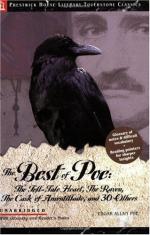“Caught from some unhappy master, whom unmerciful Disaster
Followed fast and followed faster—so, when Hope he would adjure,
Stern Despair returned, instead of the sweet Hope he dared adjure—
That sad answer, ‘Nevermore!’”
It would be well if other, and famous, poets could be as sure of making their changes always improvements. Poe constantly rehandled his scanty show of verse, and usually bettered it. The Raven was the first of the few poems which he nearly brought to completion before printing. It may be that those who care for poetry lost little by his death. Fluent in prose, he never wrote verse for the sake of making a poem. When a refrain of image haunted him, the lyric that resulted was the inspiration, as he himself said, of a passion, not of a purpose. This was at intervals so rare as almost to justify the Fairfield theory that each was the product of a nervous crisis.
What, then, gave the poet his clue to The Raven? From what misty foundation did it rise slowly to a music slowly breathed? As usual, more than one thing went to the building of so notable a poem. Considering the longer sermons often preached on brief and less suggestive texts, I hope not to be blamed for this discussion of a single lyric,—especially one which an artist like Dore has made the subject of prodigal illustration. Until recently I had supposed that this piece, and a few which its author composed after its appearance, were exceptional in not having grown from germs in his boyish verse. But Mr. Fearing Gill has shown me some unpublished stanzas by Poe, written in his eighteenth year, and entitled, “The Demon of the Fire.” The manuscript appears to be in the poet’s early handwriting, and its genuineness is vouched for by the family in whose possession it has remained for half a century. Besides the plainest germs of “The Bells” and “The Haunted Palace” it contains a few lines somewhat suggestive of the opening and close of The Raven. As to the rhythm of our poem, a comparison of dates indicates that this was influenced by the rhythm of “Lady Geraldine’s Courtship.” Poe was one of the first to honor Miss Barrett’s genius; he inscribed his collected poems to her as “the noblest of her sex,” and was in sympathy with her lyrical method. The lines from her love-poem,
“With a murmurous stir
uncertain, in the air, the purple curtain
Swelleth in and swelleth out
around her motionless pale brows,”




